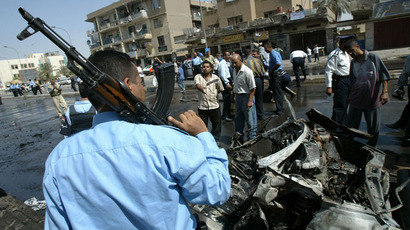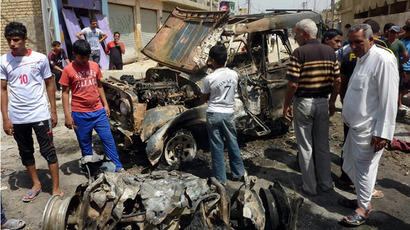At least 95 dead, dozens wounded as string of bombings hit Iraq
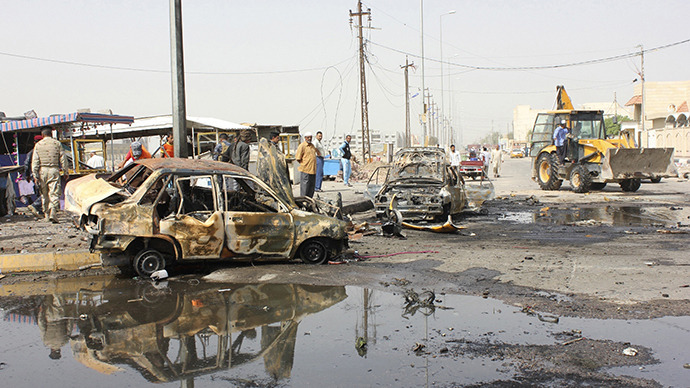
A series of bombings across Iraq has left at least 95 people dead. The blasts targeted Shia Muslims in Baghdad and Basra.
Ten car bombs detonated in Baghdad in Shiite neighborhoods, killing at least 48 people and injuring more than 150, authorities announced.
In neighboring Balad, 80 kilometers north of the capital, a car bomb killed 14 pilgrims on a bus, according to an anonymous local official.
Nine people were killed in one of two car bombs in Basra, a predominately Shia city, southeast of Baghdad.
"I was on duty when a powerful blast shook the ground," a local police officer told Reuters. "The blast hit a group of day laborers gathering near a sandwich kiosk," he said. One of the dead bodies was still clutching a blood-soaked sandwich in his hand."
Five other people were killed in a second blast inside a bus terminal in Saad Square, also in Basra, police and medics said.
Shiite worshipers were also targeted leaving a mosque in the city of Hillah, killing nine and wounding 26.
Monday’s violence also spread to Sunni areas of the country.
A car bomb in Samarra exploded near a gathering of Sunni militia waiting outside a military compound, killing three and wounding 13. According to officials, eight policemen have been killed near the town of Haditha, in the western province of Anbar, after gunmen ambushed two police patrols.
Another 13 bodies, including eight policemen were found in Anbar by the authorities in a desert area. The victims allegedly were kidnapped by gunmen on Friday and shot in the head.
The bombings are the latest in a series of attacks in both Sunni and Shiite regions, prompting fears that widespread sectarian violence is once more gripping the country.
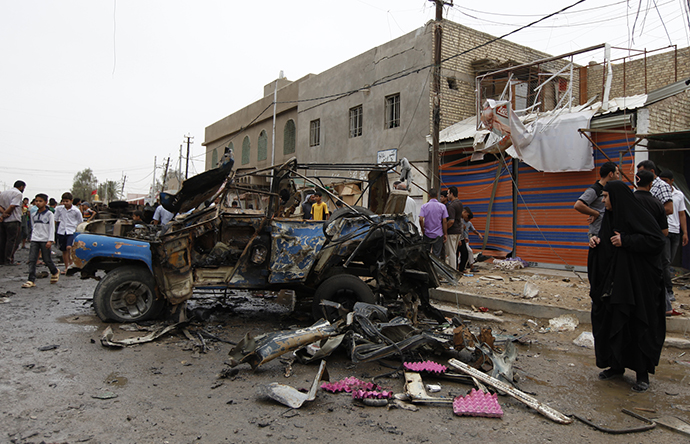
No groups have claimed responsibility for the attacks yet.
Over 100 have been killed in Iraq over the last week alone, with
76 people killed in a string of bombings just
outside Baghdad on May 17, and explosions in the capital leaving more than 35 dead on May 15.
Across April, more than 700 people, including 595 civilians, died
in Iraq “acts of terrorism,” making it the deadliest month since
June 2008, the UN’s mission in the country said. The capital
Baghdad has become the worst affected city.
Violence is below the heights of 2006-07, but he country’s
al-Qaeda wing, alongside other Sunni Muslim insurgents, have been
launching the attacks on an almost daily basis, in order to
destabilize relations between the Iraq’s Sunni Muslim minority
and its Shia population, while seeking to undermine the power of
the Shia-led government.
The number of attacks rose sharply after a deadly security
crackdown on a Sunni protest camp in the country's north on April
23.
A catalyst in the decline in relations was the series of militant
attacks on Sunni and Shiite mosques as well as against security
forces and tribal leaders, which caused animosities to mushroom.
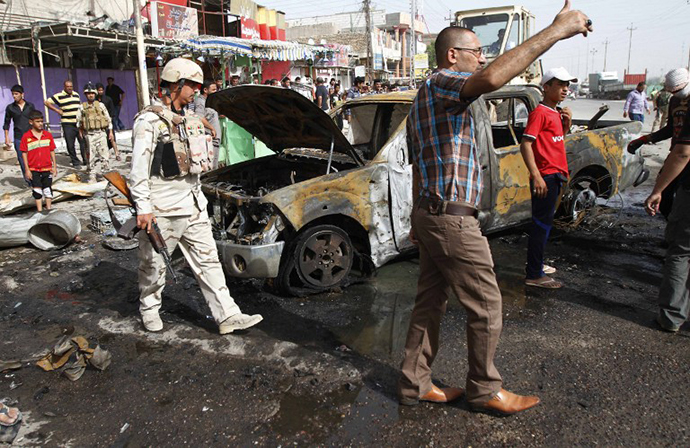
Ten years after the US declared its victory over Saddam Hussein,
Iraq is still mired in violence, with each day adding up to death
toll among its population.
Tensions between Sunnis and Shiites have been elevated since the 2003 US led invasion of the country, and following withdrawal of US troops in 2011, the Iraqi army and police force have faced difficulties in preventing an increase in insurgency and sectarian tensions.
Majority Shiites dominate the power centers in post-Saddam Iraq,
amid Sunni complaints that some laws unfairly target them as a
group and that they are treated as second-class
citizens.
“Since February the situation has been deteriorating
vis-à-vis security…people are afraid that this widespread
sectarian violence will spill over,” said RT’s Paula
Slier.
“This is fueling fears of a return to the civil war of 2006 and 2007 and we are hearing this across the spectrum that people are afraid that this widespread sectarian violence will spill over. Back in those years, tens of thousands of people were killed, so there are fears that we could now see an escalation,” she concluded.













